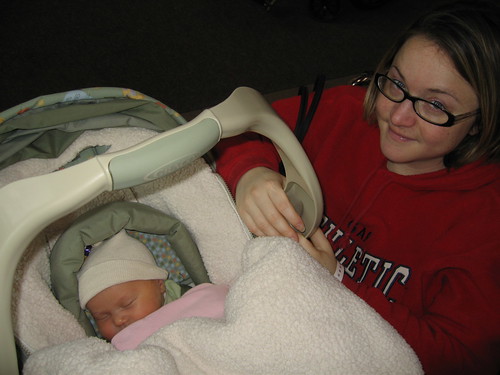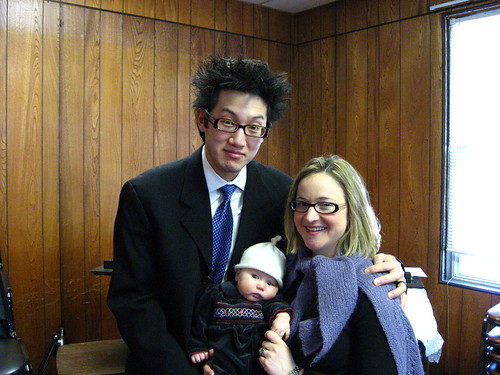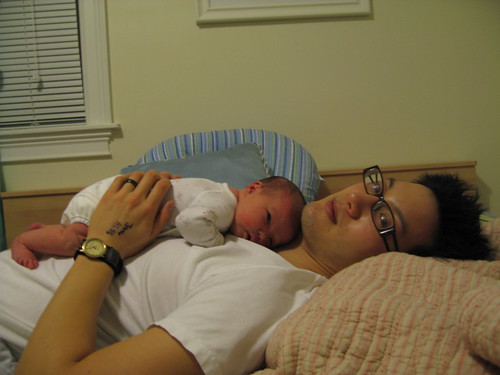Confessions of a non-Korean mama
/I have so many dear friends expecting babies this year. Come October, I'm expecting a veritable traffic jam of storks in the sky. It's reminding me of the joy of bringing our own little dumplings home. Our first experience in doing so is forever illuminated for me...
January 2008
As we are leaving the hospital with our dumpling, our pastor and his wife from the Korean church call Loverpants. They say they are on their way over to our house. There is no asking and there is no refusing. I mean, my belly has just been on the butcher block and I am having volcanic eruptions of hot hormone lava and we have a new family member that we just met, but no bigs!
 Going home from the hospital
Going home from the hospital
Our pastor and his wife meet us at home. They march through the apartment toward the kitchen where they dutifully stock our refrigerator with noodle dishes and potatoes and bread and seaweed soup P.S. GOOD FOR BREASTMILK. And then pastor offers a prayer in Korean and his wife looks askance at me trying to breastfeed.
The following week, the pastor and his wife are back for a second go-round. This time, with friends! And more seaweed soup. Ahjoomah General’s warning: Contents may make breasts explode with ample milk supply. After several hymns and prayers in Korean, all of which may have been pleas to the Almighty to make our next child an heir, the church elders begin to leave. But not before several of the ahjoomahs (Korean elder women) compress my abdomen, exclaiming “Aygoh!” I believed at one time that Aygoh! meant “Hot dog! She’s still a postnatal fatty!” in Korean.
But after reading a thing or two about samchilil, I know why they are squeezing me. Samchilil, which means 21 days, is the Korean practice of letting a woman who has just given birth to rest. Doesn't that sound amazing? If mama rests then she will regain strength and be able to take care of those around her. But my impression is that it is a fear-based rest. The postnatal mama is resting to avoid her bones going soft and all of her teeth falling out. True fear. The mother is to stay indoors, drink miyuk-kuk (seaweed soup), avoid cold (even drinking an iced beverage), and sometimes she even wears a girdle. Not kidding, players, an honest-to-goodness girdle. Hence why the ahjoomahs are squeezing the place where a baby used to be. Aygoh!
Exit: Team Ahjoomah, stage left.
Irritated and exhausted, I walk to the kitchen to see the spoils of the meals on wheels. I open the refrigerator and there it is: the familiar pots and pans, the kimchee and the burnt rice. The potluck ministry had come to love on me today.
I’m told no matter the denomination, it’s the same scene at any Korean-American church. The potluck is the thing. I’ll never be able to consume the topographic mounds of rice that my church sisters manage to wolf down, but I always enjoy it. Is there really no such thing as a free lunch? Have I paid for my meal ticket through every awkward encounter at K-church? Perhaps. But I’ve never been asked to contribute to the potluck. For the most part, I’ve been a taker. For me, this is God’s grace come to life in a silver pot. We’ve done nothing to deserve it and done everything wrong to be denied it, but He lavishes it on us like a smiling Korean ahjoomah whose delight derives entirely on its acceptance.
 Our first time at church as a famiLee
Our first time at church as a famiLee
The Korean church loved me through my twenties. The ahjoomahs loved me in a way that I found peculiar, in ways that I never would have chosen to be loved. But there’s no menu at a buffet. Only a bounty of the interesting and colorful, the flavorful, sweet, sour, and spicy.

